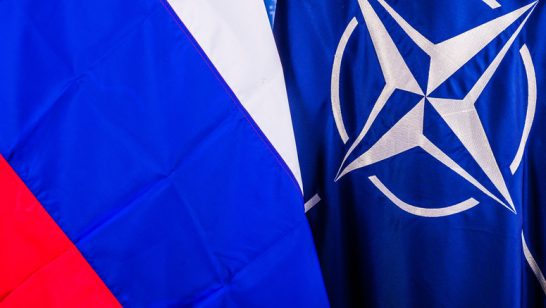Statement by the Euro-Atlantic Security Leadership Group*
Support for Crisis Management Dialogue and Strategic Stability in the Euro-Atlantic Region
Today, the United States, NATO, and Russia continue to severely curtail dialogue on crisis
management in the Euro-Atlantic region, depriving ourselves of an essential tool to prevent an incident from turning into unimaginable catastrophe. The lack of effective and reliable crisis management dialogue and tools sharpens mistrust and undercuts progress on broader issues, including the implementation of the Minsk II agreement, Ukraine, and the US/NATO-Russia relationship.
In this statement, the Euro-Atlantic Security Leadership Group provide a foundation for crisis management advocacy, analysis of steps, and bringing together nongovernmental and governmental, and civilian and military, participants.
Recommended areas of examination in 2019 include:
1. Examine areas of bilateral and multilateral crisis management that are in use today. For example, Latvia and Russia recently concluded the process of demarcation of the state border, and Latvia and Belarus concluded a bilateral agreement to exchange information on military flights near their border. Turkey and Russia are now conducting joint patrols in Idlib province. Open Skies flights are expected to resume with a regular program in 2019. Also deserving of examination is the work of the Baltic Sea Project Team under the auspices of the International Civil Aviation Organization. There are new forums outside of traditional avenues for engagement, such as the Riga Dialogue and the EASLG’s Crisis Management Dialogue Working Group.
2. Examine the “gaps” and their associated risks in the Vienna Document—and how these gaps can be filled, and the risks reduced.
3. Examine the potential for the OSCE’s Structured Dialogue and whether the work of the EASLG’s Crisis Management Dialogue Working Group can in any way help catalyze or contribute to work in this channel (e.g., focusing on specific measures that can make each side less concerned about the other side’s activities and exercises).
###
* For the past three years, Des Browne, Wolfgang Ischinger, Igor Ivanov, Sam Nunn, and their respective organizations—the European Leadership Network (ELN), the Munich Security Conference (MSC), the Russian International Affairs Council (RIAC), and the Nuclear Threat Initiative (NTI)—have been working with former and current officials and experts from a group of Euro-Atlantic states and the European Union to test ideas and develop proposals for improving security in areas of existential common interest. The Euro-Atlantic Security Leadership Group (EASLG) operates as an independent and informal initiative, with participants who reflect the diversity of the Euro-Atlantic region from the United States, Canada, Russia, and fifteen European countries.
Signatories for the Support of Crisis Management Dialogue and
Strategic Stability in the Euro-Atlantic Region
Co-Conveners
Des Browne
Vice Chair, Nuclear Threat Initiative; Chair of the Board of Trustees and Directors of the European Leadership Network; and former Secretary of State for Defence, United Kingdom
Ambassador (Botschafter) Professor Wolfgang Ischinger
Chairman (Vorsitzender), Munich Security Conference Foundation, Germany
Igor Ivanov
Former Minister of Foreign Affairs,Russia
Sam Nunn
Co-Chair, Nuclear Threat Initiative; and former U.S. Senator, United States
Participants
Ambassador Brooke Anderson
Former Chief of Staff, National Security Council, United States
Steve Andreasen
National Security Consultant, Nuclear Threat Initiative; and former Director for Defense Policy and Arms Control, National Security Council, United States
Joel Bell
Chairman, Chumir Foundation for Ethics in Leadership, Canada
Robert Berls
Senior Advisor for Russia and Eurasia, Nuclear Threat Initiative; and former Special Assistant for Russia/NIS Programs to the Secretary of Energy, United States
Philip Mark Breedlove
General (Ret), United States Air Force; former Commander, U.S. European Command, and 17th Supreme Allied Commander Europe of NATO Allied, United States
William J. Burns
President, Carnegie Endowment for International Peace, United States
Ambassador Richard Burt
Chairman Global Zero USA, United States
E. Buzhinskiy
Chairman of PIR Center Executive Board; Vice-President of RIAC; and Lt-General (Ret), Russia
General (Ret) Vincenzo Camporini
Vice President, Istituto Affari Internazionali, Italy
James F. Collins
(Amb. Retired) Senior Fellow, Russia and Eurasia Program, Carnegie Endowment for International Peace, United States
Admiral Giampaolo Di Paola
Former Chief of Defence; former Chairman of NATO’s Military Committee; former Minister of Defence, Italy
Ambassador Rolf Ekéus
Diplomat and Chairman Emeritus of the Stockholm International Peace Research Institute, Sweden
Air Marshal Sir Chris Harper KBE
United Kingdom
James L. Jones
General (Ret), USMC; President, Jones Group International, United States
Ian Kearns
CEO, The Oracle Partnership, United Kingdom
Roderich Kiesewetter
Member of Bundestag, Germany
Bert Koenders
Former Minister of Foreign Affairs, Netherlands
Andrey Kortunov
Director General of the Russian International Affairs Council, Russia
Łukasz Kulesa
Research Director and Head of the Warsaw Office, European Leadership Network, Poland
Imants Lieģis
Former Minister of Defence, Latvia
O. Faruk Loğoğlu
Former Ambassador to the United States; and Undersecretary of the Ministry of Foreign Affairs, Turkey
Ernest J. Moniz
Co-Chair and CEO, Nuclear Threat Initiative; and former U.S. Secretary of Energy, United States
Ferdinando Nelli Feroci
President, Istituto Affari Internazionali, Italy
Professor Roland Paris
University Research Chair in International Security and Governance, University of Ottawa, Canada
Paul Quilès
Former Defence Minister; and Chairman of IDN (Initiatives for Nuclear Disarmament), France
Bruno Racine
Chairman, Fondation pour la recherche stratégique, France
Ambassador Māris Riekstiņš
Former Foreign Minister, Latvia
Joan Rohlfing
President and Chief Operating Officer, Nuclear Threat Initiative, United States
Matthew Rojansky
Director of the Wilson Center’s Kennan Institute, United States
Lynn Rusten
Vice President, Global Nuclear Policy Program, Nuclear Threat Initiative, United States
General Igor Petrovich Smeshko
Former Head of the Security Service (SBU) (2003–2005), Ukraine
James Stavridis
Admiral (Ret), United States Navy; former Supreme Allied Commander at NATO, United States
Stefano Stefanini
Former Italian Permanent Representative to NATO; ELN Executive Board; Atlantic Council Nonresident Senior Fellow; and Project Associates Brussels Director, Italy
Page Stoutland
Vice President, Scientific and Technical Affairs, Nuclear Threat Initiative, United States
Adam Thomson
Director, European Leadership Network, United Kingdom
Nathalie Tocci
Director, Istituto Affari Internazionali; and Special Advisor HRVP Federica Mogherini, Italy
Sergey Utkin
Primakov Institute of World Economy and International Relations, Russia
General (Ret) Dr. Erich Vad
Lecturer at the Universities of Munich and Salzburg, Germany
Isabelle Williams
Senior Advisor, Global Nuclear Policy Program, Nuclear Threat Initiative, United Kingdom
Marcin Zaborowski
Former Executive Director, Polish Institute of International Affairs (2010–2015), Poland



